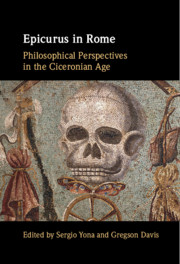Book contents
- Epicurus in Rome
- Epicurus in Rome
- Copyright page
- Contents
- Illustrations
- Contributors
- Acknowledgements
- Chapter 1 Introduction
- Part I Epicurus and Roman Identities
- Part II Epicurus and Lucretian Postures
- Chapter 7 “Love It or Leave It”: Nature’s Ultimatum in Lucretius’ On the Nature of Things (3.931–962)
- Chapter 8 Kitsch, Death and the Epicurean
- Chapter 9 Page, Stage, Image: Confronting Ennius with Lucretius’ On the Nature of Things
- Chapter 10 Lucretius on the Size of the Sun
- Bibliography
- General Index
Chapter 8 - Kitsch, Death and the Epicurean
from Part II - Epicurus and Lucretian Postures
- Epicurus in Rome
- Epicurus in Rome
- Copyright page
- Contents
- Illustrations
- Contributors
- Acknowledgements
- Chapter 1 Introduction
- Part I Epicurus and Roman Identities
- Part II Epicurus and Lucretian Postures
- Chapter 7 “Love It or Leave It”: Nature’s Ultimatum in Lucretius’ On the Nature of Things (3.931–962)
- Chapter 8 Kitsch, Death and the Epicurean
- Chapter 9 Page, Stage, Image: Confronting Ennius with Lucretius’ On the Nature of Things
- Chapter 10 Lucretius on the Size of the Sun
- Bibliography
- General Index
Summary
Focusing on the revelation of Epicurean thanatology in the third book of On the Nature of Things, this essay argues that the most vehement strains of Lucretius’ diatribe against the fear of death are a polemic against kitsch. It explicates the pervasively frank, anti-kitsch stance of Epicureanism and explores how Lucretius combats kitsch, even as kitsch was enthusiastically circulated in other Roman contexts in the form of Epicurean objects and clichés. In the vignettes of the departed father and the maudlin drinkers in DRN 3, Lucretius draws our attention to the way that kitsch (the image of the stereotypically sweet children, the trite lamentation, the pseudo-philosophy, the falseness) occludes reality. The denunciation of kitsch is fundamental to Epicurean teaching: to deny that our metaphorical city has penetrable walls and to bemoan the eventuality of one’s own death is to refuse the nature of things.
Keywords
- Type
- Chapter
- Information
- Epicurus in RomePhilosophical Perspectives in the Ciceronian Age, pp. 129 - 146Publisher: Cambridge University PressPrint publication year: 2022
- 2
- Cited by

